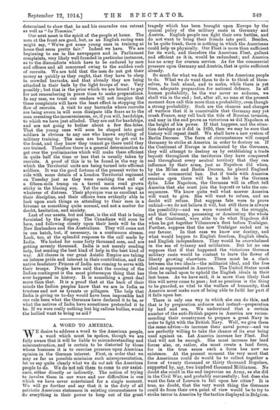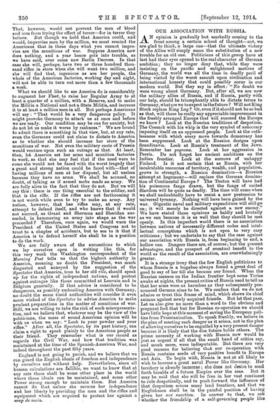A WORD TO AMERICA.
WE desire to address a word to the American people, a word which must be spoken, though we are fully aware that it will be liable to misunderstanding and misconstruction, and is certain to be distorted by those whose business it is to exercise pressure upon American opinion in the German interest. First, in order that we may as far as possible minimize such misrepresentation, let us say quite clearly what we do not ask the American people to do. We do not ask them to come to our assist- auce, either directly or indirectly. The notion of trying to involve them in our wars and our difficulties is one which we have never entertained for a single moment. We will go further and say that it is the duty of all patriotic American statesmen in existing circumstances to do everything in their power to keep out of the great tragedy which has been brought upon Europe by the cynical policy of the military caste in Germany and Austria. English people can fight their own battles, and do not want to bring their friends into peril. Besides, to be quite frank, there is nothing in which the Americans could help us physically. Our Fleet is more than sufficient for its work, and therefore the American Fleet, gallant and efficient as it is, would be redundant ; and America has no army for oversea service. As for the commercial pressure upon Germany and Austria, that is quite sufficient already.
So much for what we do not want the American people to do. What we do want them to do is to think of them- selves, to look ahead, and to make, while there is yet time, adequate preparation for national defence. In all human probability, be the war never so arduous, we shall win in the end ; but, after all, no man at the present moment dare call this more than a probability, even though a strong probability. Such are the chances and changes of warfare that it is conceivable that Germany may yet crush France, may roll back the tide of Russian invasion, and may in the end prove as victorious as did Napoleon at the height of his power. If that happens, and the situa- tion develops as it did in 1810, then we may be sure that history will repeat itself. We shall have a new system of Berlin Decrees. The force of circumstances will compel Germany to strike at America in order to destroy us. If the Continent of Europe is dominated by the Germans, they will attempt to destroy us by establishing a trade boycott throughout the territories they have conquered and throughout every neutral territory that they can influence by their arms, just as Napoleon did when, by the Milan and Berlin Decrees, he placed England under a commercial ban. But if trade with America remains open there will be a leak in the German dyke. Like Napoleon, the Germans will in effect tell America that she must join the boycott or take the con- sequences. We know quite well what answer America will want to give. She will want to refuse, and no doubt will refuse. But suppose fate were to prove unkind—we do not believe it will, but still there is always the possibility—and we were worsted in the struggle, and that Germany, possessing or dominating the whole of the Continent, were able to do what Napoleon did when he got together Villeneuve's fleet before Trafalgar. Further, suppose that the new Trafalgar ended not in our favour. In that case we know our destiny, and what would happen to English freedom, English ideals, and English independence. They would be overwhelmed in the sea of tyranny and militarism. But let no one suppose that if that happened the victorious German military caste would be content to leave the flower of liberty growing elsewhere. There must be a clash between the two ideals—the militarist ideal, and the free ideal as represented in America. The United States must then be called upon to uphold the English ideals in their last home. As we have said, it is more than likely that this will never come to pass ; but so precious is the thing to be guarded, so vital to the welfare of humanity, that America must make sure of being able to fulfil her part if it falls upon her.
There is only one way in which she can do this, and that is by preparation arduous and instant—preparation by land and sea. We understand that a certain number of the anti-British papers in America are recom- mending their countrymen to prepare a great Navy in order to fight with the British Navy. Well, we give them the same advice—to increase their naval power—and we are perfectly willing to take the chance of its ever being used against us. Let America increase her Fleet. But that will not be enough. She must increase her land forces also, or, rather, she must create a land force, for in the true sense such a force has now no existence. At the present moment the very most that the Americans could do would be to collect together a force of twenty thousand or thirty thousand Regulars, supported by, say, two hundred thousand Militiamen. No doubt she could in the end improvise an Army, as she did in the Civil War, and probably successfully; but does she want the fate of Louvain to fall upon her cities ? It is true, no doubt, that the very worst thing the Germans could do from their own point of view would be to try to strike terror in America by the tactics displayed in Belgium. That, however, would not prevent the men of blood and iron from trying the effect of terror—for in terror they believe. But though we hold that America could, and would, improvise men by the million, we must remind the Americans that in these days what you cannot impro- vise are the munitions of war. Suppose America now does nothing, and a year hence gets into trouble, as we have said, over some new Berlin Decrees. In that case she will, perhaps, have two or three hundred thou- sand rifles in store when she will .want two million, and she will find that, ingenious as are her people, the whole of the American factories, working day and night, will not be able to turn out more than a few thousands a week.
What we should like to see America do is considerably to augment her Fleet, to raise her Regular Army to at least a quarter of a million, with a Reserve, and to make the Militia a, National and not a State Militia, and increase it to at least a million men in all. But perhaps Americans will say : "That would be a very dangerous policy. It might provoke Germany to attack us at once and before we are ready. Our condition may be one for anxiety, but do not let us make it worse by rashness." We are bound to admit there is something in that view, but, at any rate, even the Germans could not claim to dictate to America as to whether she should increase her store of the munitions of war. Not even the military caste of Prussia would venture upon such an outrage as that. At least, then, let America set her arms and munition factories to work, so that she may feel that if the need were to come she would not be faced with the worst tragedy that a great and strong nation could be faced with—that of having millions of men at her disposal, but all useless because they have no arms. We shall be accused, no doubt, of talking as if armed mobs made an army. We are fully alive to the fact that they do not. But we will say this : there is one thing essential to the soldier, and that is the rifle. If the rifles are not forthcoming it is not worth while even to try to make an army. Any nation, however, that has rifles may, at any rate, attempt to defend itself, and who knows that it would not succeed, as Grant and Sherman and Sheridan suc- ceeded, in hammering an army into shape as the war proceeded ? Therefore, once again, we would warn the President of the United States and Congress not to trust to a chapter of accidents, but to see to it that if America is to defend herself she shall be in a position to do the work.
We are fully aware of the accusations to which we lay ourselves open in writing like this, for this very week the Washington correspondent of the Morning Post tells us that the highest authority in America, meaning no doubt the President, was much disgusted and annoyed by the suggestion of the Spectator that America, true to her old role, should speak up for the rights of independent nations, and protest against outrages like those committed at Louvain and in Belgium generally. If that advice is considered to be dangerous, as possibly embroiling America with Germany, no doubt the same timid authorities will consider it even more wicked of the Spectator to advise America to make prudent preparations in the matter of munitions of war. Still, we are willing to take the risk of such misrepresenta- tion, and we believe that, whatever may be the view of the politicians, the mass of sound American opinion will be with us when we say: " Look to your powder and your rifles." After all, the Spectator, by its past history, can claim a right to speak plainly to the American people as their friend. They remember what is our record as regards the Civil War, and how that tradition was maintained at the time of the Spanish-American War, and indeed throughout the past fifty years.
England is not going to perish, and we believe that we can guard the English ideals of freedom and independence by ourselves and without help. Nevertheless, since all human calculations are fallible, we want to know that at any rate there shall be some other place in the world where those ideals can be maintained, and some other Power strong enough to maintain them. But America cannot do that unless she secures her independence and her liberty by providing the men and the rifles and equipment which are required to protect her against a coup de main.



































 Previous page
Previous page